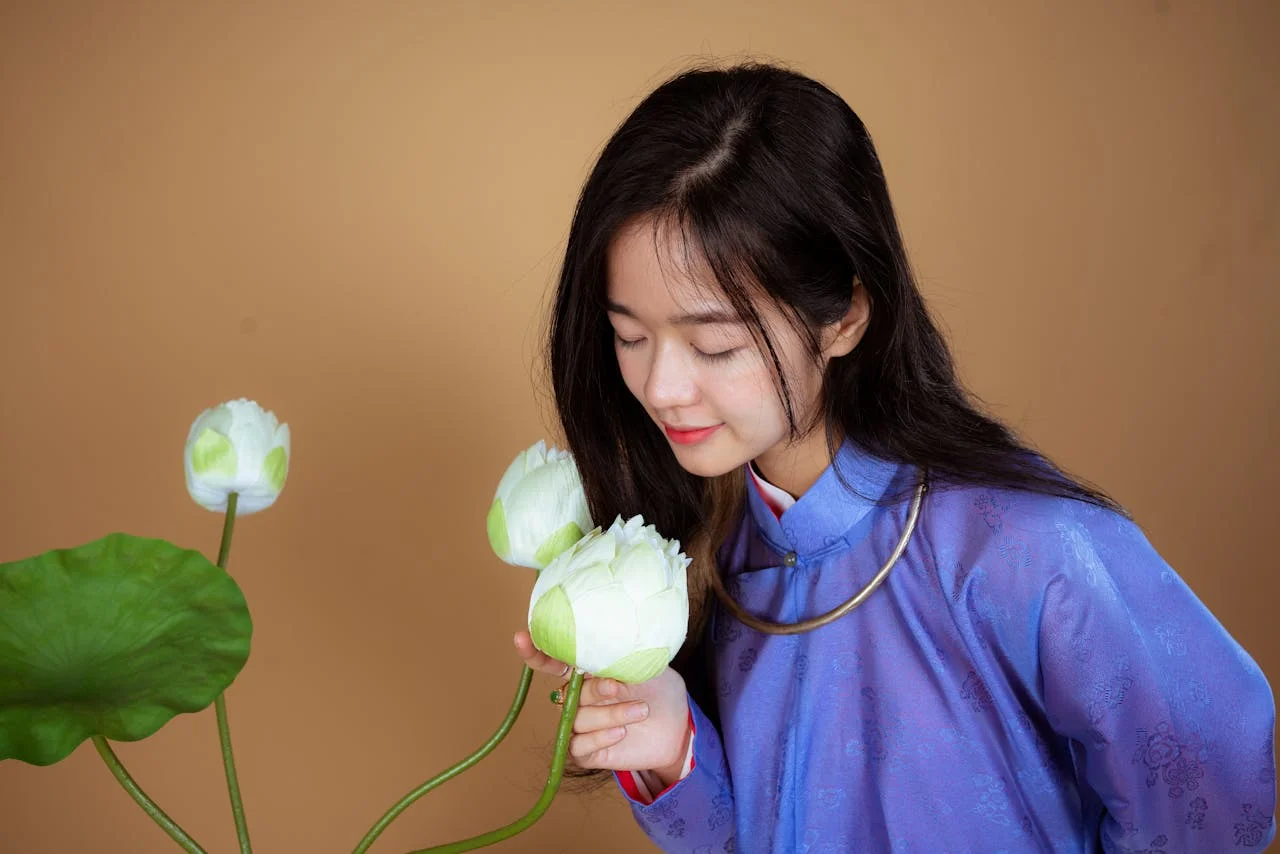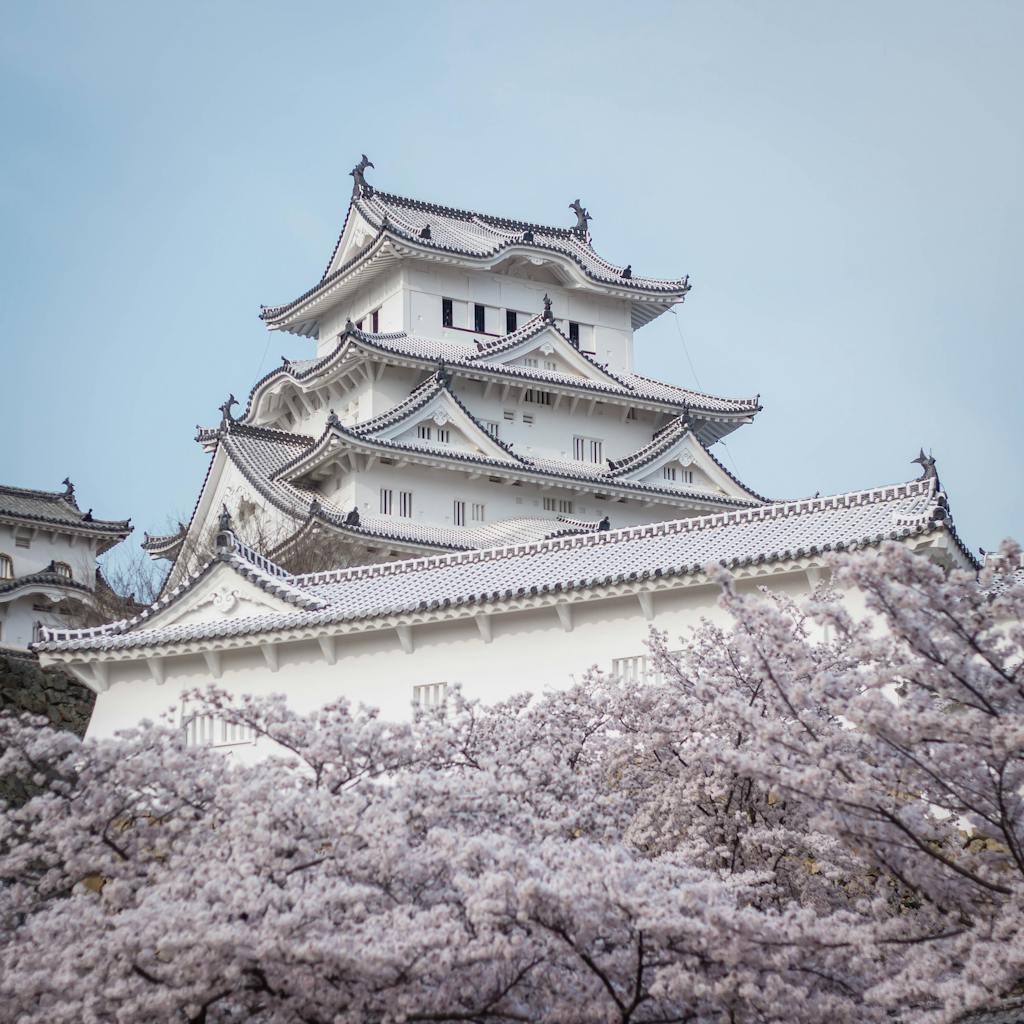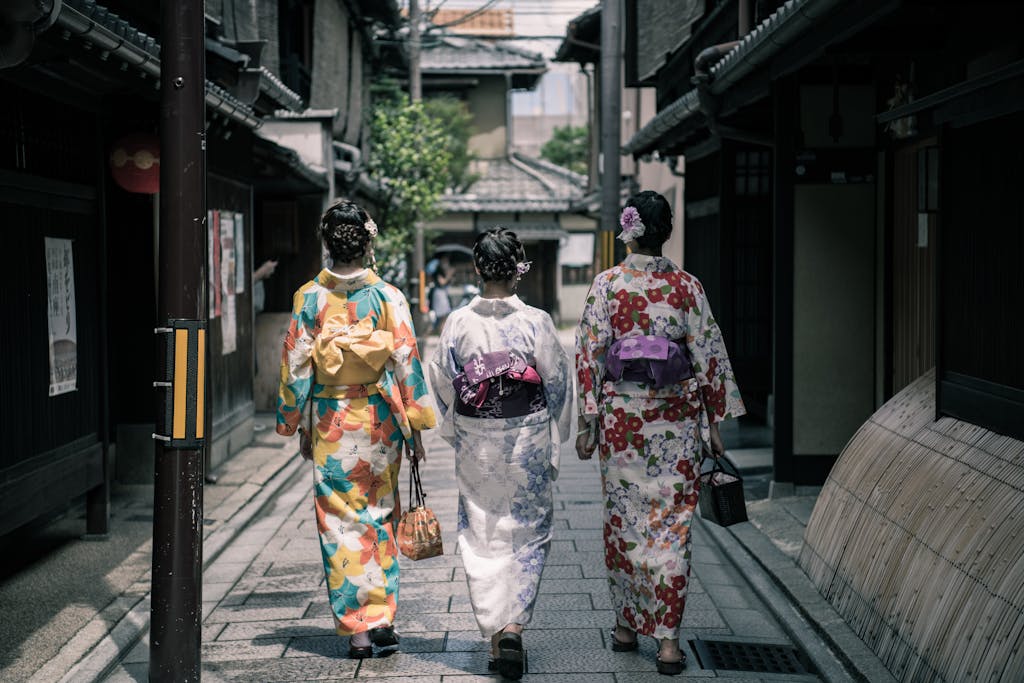
You’re probably drowning in wellness advice that feels impossible to maintain, but I can tell you that Japanese self-care practices cut through the complexity with remarkable simplicity. These aren’t trendy hacks or demanding routines—they’re time-tested principles that quietly transform your daily experience without overwhelming your schedule. I’ve never seen approaches that balance effectiveness with such gentle sustainability, and once you understand how spaciousness, imperfection, and mindful restraint can revolutionize your wellbeing, you’ll wonder why you’ve been making self-care so complicated.
Forest Bathing (Shinrin-yoku): Immersing Yourself in Nature’s Healing Energy

When you step into a forest and feel that immediate sense of calm wash over you, you’re experiencing what the Japanese have formalized into a powerful self-care practice called shinrin-yoku, or forest bathing.
That immediate sense of calm you feel stepping into a forest is shinrin-yoku, Japan’s formalized forest bathing practice.
I can tell you this isn’t just a leisurely walk through the woods. You’re strategically engaging all five senses to absorb nature’s healing compounds. Breathe deeply to inhale phytoncides, natural chemicals trees release that boost your immune system and reduce stress hormones.
I’ve never seen anything work faster for mental clarity. Spend twenty minutes touching bark, listening to rustling leaves, observing light patterns through branches. Your nervous system shifts from fight-or-flight to rest-and-digest mode, lowering blood pressure and increasing focus.
This practice transforms scattered energy into laser-sharp mental power. These moments in nature serve as intentional pauses that pull you back from the mental chaos of daily overwhelm, creating the stillness needed for genuine self-reflection.
Radio Taiso: Starting Your Day With Gentle Morning Exercises
Although millions of people struggle to find motivation for morning exercise, Japan’s radio taiso transforms your wake-up routine into something you’ll actually want to do. I can tell you this isn’t your typical grueling workout that leaves you exhausted before breakfast. These gentle, flowing movements work every muscle group through simple arm circles, leg swings, and rhythmic breathing patterns that take just six minutes.
I’ve never seen a practice that builds discipline quite like this daily commitment. You’re not pushing through pain, you’re awakening your body with purposeful movement that increases blood flow, improves flexibility, and sharpens mental focus. The beauty lies in its accessibility – you don’t need equipment, special clothes, or even much space. Millions of Japanese workers start their day this way, creating unstoppable momentum that carries through every challenge ahead.
This practice perfectly embodies the essence of joining the 5 AM club, where those precious early morning moments become a foundation for possibility and purpose that ripples through your entire day.
Hara Hachi Bu: The Art of Eating Until 80% Full
The ancient Okinawan practice of hara hachi bu holds the secret to why Japan has one of the world’s longest lifespans, and I can tell you it’s simpler than any diet you’ve ever tried.
You eat until you’re 80% full, then stop. That’s it. No calorie counting, no forbidden foods, no complicated meal plans. I’ve watched people transform their relationship with food using this single principle, and the results speak volumes.
Your stomach takes twenty minutes to signal fullness to your brain. By stopping at 80%, you give your body time to register satisfaction naturally. You’ll discover sustained energy levels, better digestion, and effortless weight management.
Start by eating slower, putting your fork down between bites, and asking yourself: “Am I satisfied?” Trust that subtle feeling before fullness hits.
Just like financial success, developing healthy eating habits isn’t about knowing the perfect formula—it’s about understanding your behavior patterns and how they shape your daily choices.
Omakase Mentality: Surrendering Control and Trusting the Process
If you’ve ever sat at a sushi counter and ordered omakase, you’ve experienced something profound that extends far beyond raw fish and rice. You’ve practiced the art of surrendering control, trusting someone else’s expertise completely. I can tell you this mindset transforms how you approach challenges in every area of your life.
Surrendering control isn’t about giving up—it’s about trusting expertise and discovering what becomes possible when you stop micromanaging outcomes.
The omakase mentality teaches you to release your death grip on outcomes and trust the process.
Here’s how to harness this power:
- Accept uncertainty as your ally – Stop trying to control every variable and start leveraging what you can’t predict
- Trust qualified expertise – Recognize when someone knows more than you do
- Embrace the unknown journey – Let go of rigid expectations and discover unexpected opportunities
This surrender isn’t weakness—it’s strategic intelligence. Research shows that psychological flexibility, the ability to adapt to changing circumstances, predicts better mental health outcomes than rigid planning.
Wabi-Sabi Living: Finding Beauty in Imperfection and Impermanence

When you walk through a traditional Japanese garden and notice how the weathered stone lantern draws your eye more than any pristine sculpture could, you’re witnessing wabi-sabi in action. This philosophy transforms how you see flaws, aging, and transience.
This philosophy transforms how you see flaws, aging, and transience.
I can tell you that embracing wabi-sabi shifts your mindset from perfectionist to powerful observer. You start celebrating the crack in your favorite mug, the faded color of beloved jeans, the silver streaks in your hair. These aren’t failures—they’re evidence of a life fully lived.
Practice wabi-sabi by displaying weathered objects, keeping wilted flowers until they’re completely spent, leaving small imperfections in your work. Rather than chasing perfection, focus on present-moment awareness as you appreciate the beauty in what simply is. I’ve never seen anyone regret accepting their authentic, imperfect reality instead of chasing impossible standards.
Ofukuro No Aji: Nurturing Yourself With Simple, Home-Cooked Meals

Nothing beats the comfort you feel when someone who truly cares about you prepares a meal just for you, and ofukuro no aji captures exactly that healing power. This concept literally means “mother’s taste,” representing the profound self-care that comes from nurturing yourself with simple, homemade food.
I can tell you that cooking for yourself isn’t just about nutrition—it’s about claiming control over your well-being. When you prepare your own meals, you’re taking charge of your health, your time, and your peace of mind.
Transform your kitchen into a sanctuary with these practices:
- Start with miso soup – one pot, five minutes, endless comfort
- Master rice cooking – the foundation that grounds every meal
- Embrace seasonal vegetables – let nature guide your choices
Morning self-care becomes especially powerful when you begin with nourishing protein-rich breakfasts that fuel both your body and spirit for the day ahead.
Ma (間): Embracing the Power of Purposeful Pauses and Empty Space
The Japanese concept of ma teaches you that empty space holds just as much power as the things that fill it, and I can tell you this understanding will revolutionize how you approach rest, work, and daily life. You’ll discover that purposeful pauses aren’t weakness, they’re strategic power moves that sharpen your focus and boost your effectiveness.
I’ve seen people transform their days by building ma into their routines. Take three deep breaths between meetings, let silence settle after important conversations, or simply sit without checking your phone for five minutes. These empty moments aren’t wasted time, they’re fuel for your next move. Ma creates space for clarity to emerge, decisions to crystallize, and your nervous system to reset. Unlike passive rest that often leaves you feeling drained, these intentional pauses function as active recovery that truly restores your mental and emotional energy. Master this practice, and you’ll command situations with calm authority.
Zazen Meditation: Cultivating Stillness Through Seated Practice

Zazen meditation strips away every distraction, every cushion of comfort, and every excuse you’ve used to avoid sitting with your own mind, and I can tell you this ancient Zen practice will challenge you in ways that reveal your true mental strength.
You’ll sit in silence, spine straight, eyes slightly open, focusing on your breath while thoughts crash like waves against your awareness. I’ve never seen anything build mental resilience faster than this disciplined practice.
Master zazen with these fundamentals:
- Posture matters – Sit cross-legged or in a chair, spine erect, hands forming a mudra
- Breathe naturally – Don’t control your breath, simply observe each inhale and exhale
- Notice without judging – Watch thoughts arise and pass without engaging or pushing them away
This isn’t relaxation, it’s mental conditioning that builds unshakeable focus. The key is mastering the art of showing up consistently, because even when your meditation sessions feel ineffective, you’re building the identity-based habits that transform you into someone who naturally cultivates inner stillness.
Tsundoku: The Mindful Art of Collecting Books for Future Reading
While zazen trains your mind through emptiness, tsundoku builds your intellectual foundation through purposeful accumulation, and I can tell you this Japanese practice of collecting unread books transforms how you approach lifelong learning.
You’re not hoarding when you practice tsundoku—you’re creating a personal knowledge bank. I’ve seen powerful people maintain libraries of unread books because they understand something vital: having the right book available at the right moment changes everything.
Don’t feel guilty about those stacks of unread books on your nightstand. They represent future possibilities, not failures. I can tell you that tsundoku works because it positions you for unexpected opportunities.
Buy books when you encounter them, not when you need them. Your future self will thank you when the perfect resource sits within arm’s reach.
Consider opening a specialized online bookstore to turn your passion for book collecting into a curated business that helps others build their own meaningful libraries.
Temizu: Purifying Rituals for Mental and Spiritual Cleansing
Before you enter any sacred space in Japan, temizu teaches you that true purification begins with intention, not just action, and I can tell you this ancient ritual transforms how you approach mental clarity in your daily life.
True purification starts with intention, not action – this ancient Japanese wisdom transforms how you approach mental clarity daily.
I’ve never seen anything reset my mindset faster than this simple water ceremony. You don’t need a shrine – your bathroom sink works perfectly.
Here’s how you master temizu for daily mental cleansing:
- Rinse your left hand first, then your right, visualizing worries washing away
- Cleanse your mouth by cupping water in your left palm, spitting it out completely
- Purify the ladle handle you used, leaving no trace of your presence
This isn’t just about physical cleaning – you’re commanding your mind to release negativity and embrace focused intention. Like the practice of digital mono no aware, temizu helps you recognize mental clutter’s drain and embrace the impermanence of your daily worries and distractions.
Mono No Aware: Appreciating Life’s Fleeting Moments and Seasonal Changes

The cherry blossoms teach you everything about mono no aware – that bittersweet awareness of life’s impermanence that transforms how you experience every moment. I can tell you that mastering this mindset gives you incredible power over your emotional well-being. You stop clinging to things that must naturally end, whether it’s a perfect sunset, your child’s laughter, or even difficult times.
You start noticing autumn leaves differently, appreciating their brief glory instead of mourning summer’s death. Your morning coffee becomes precious because you know this exact moment won’t repeat. This isn’t passive acceptance – it’s active appreciation that makes you unstoppable, grounded in reality while finding beauty everywhere.
Omotenashi: Practicing Selfless Hospitality Toward Others and Yourself

Three minutes spent watching a Japanese hotel worker bow to an empty elevator after guests exit will teach you everything about omotenashi – that profound practice of selfless hospitality that goes far beyond simple politeness.
I can tell you this principle transforms how you treat yourself. When you practice omotenashi internally, you anticipate your own needs with compassion, creating space for genuine self-care.
Here’s how to master this power:
- Prepare your environment – Set up your space before you need it, like laying out tomorrow’s clothes
- Anticipate emotional needs – Stock healthy snacks when you’re feeling strong, not desperate
- Practice invisible kindness – Leave encouraging notes for your future self
I’ve never seen anything create more lasting change than treating yourself with the same meticulous care you’d show an honored guest.
Nemawashi: Building Harmony Through Patient Relationship Cultivation
Watching a master gardener tend roots beneath the soil reveals the essence of nemawashi – that deliberate art of cultivating relationships through patient, behind-the-scenes groundwork that creates unshakeable harmony long before conflicts ever surface.
I can tell you that nemawashi transforms your personal power by investing in people before you need them. You’re building trust deposits through small, consistent actions – recalling someone’s concerns, following up on their projects, offering support without expecting immediate returns.
I’ve never seen anyone regret practicing nemawashi. When you need buy-in for your ideas, you’ll find allies already prepared to support you. Start conversations early, listen genuinely to objections, and address concerns privately before public discussions. This isn’t manipulation – it’s strategic relationship building that creates win-win outcomes while positioning you as someone who values collaboration over confrontation.
Yutori: Creating Spaciousness and Breathing Room in Your Daily Life
Four minutes of buffer time between meetings might seem insignificant, but it represents the profound Japanese concept of yutori – the intentional creation of spaciousness that prevents your life from becoming a breathless sprint from one obligation to the next.
Yutori teaches us that the space between moments is where we find our power, not in the relentless pursuit of more.
I can tell you that powerful people understand this: rushing creates mistakes, stress clouds judgment, and burnout kills performance. Yutori gives you the breathing room to maintain your edge.
- Add 10-minute buffers between appointments to process, bridge, and reset your mental state
- Block “thinking time” in your calendar like you’d any critical meeting
- Create physical spaciousness by decluttering your workspace and removing visual distractions
I’ve never seen anyone sustain peak performance without this kind of intentional space.
Conclusion
These Japanese practices aren’t just ancient wisdom, they’re your roadmap to sustainable wellness. I can tell you from experience, when you create spaciousness in your days and embrace imperfection, everything shifts. You’ll stop running on empty and start operating from a place of calm strength. Pick one practice that resonates with you today. Your future self will thank you for choosing intentional living over endless hustle.



Pingback: 17 Easy Specialty Sauces That Sell Like Crazy